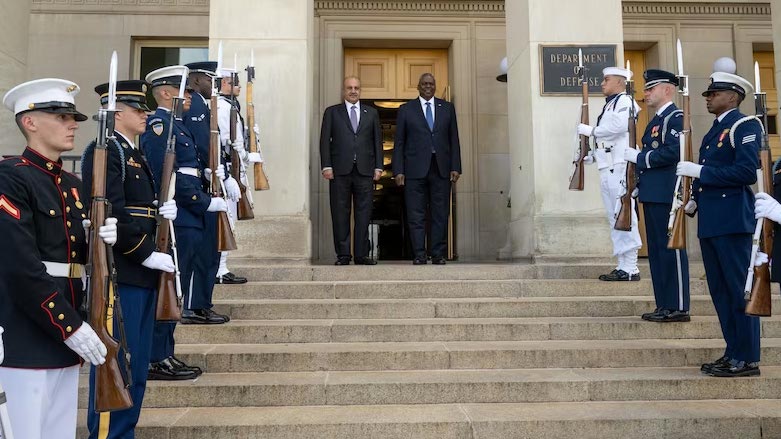US-Iraq Security Dialogue Reaffirms Mutual Commitment to Continued Cooperation

WASHINGTON DC, United States (Kurdistan 24) – Monday was the first day of the inaugural session of the U.S.-Iraq Joint Security Cooperation Dialogue (JCSD.)
Read More: Defense Secretary Affirms U.S. Support for Iraq in First Day of Strategic Dialogue
The Dialogue continued into Tuesday, with both sides “reaffirming their commitment to security cooperation” and their “shared interest in regional stability,” according to a joint statement issued at the conclusion of the meetings.
The Dialogue aimed to establish a basis for enduring security ties between the two countries which will last beyond their shared fight against ISIS. That point was illustrated by the Pentagon’s own website.
On Tuesday afternoon, with the conclusion of the Dialogue, it featured a Department of Defense news report entitled, “U.S., Iraq Examine New Strategic Relationship.”
To judge by the final, joint statement, that goal appears to have been achieved.
Iraqi Delegation included Peshmerga Officers
Three senior Kurdish officers were members of the Iraqi delegation. They included the Chief of Staff to the Ministry of Peshmerga Affairs, the equivalent in U.S. terms of the Chairman of the Joint Chiefs of Staff.
The Iraqi delegation was led by Minister of Defense Thabit al-Abbasi, while Assistant Secretary of Defense Celeste Wallander led the U.S. delegation.
Wallander visited Iraq in September, and in Erbil, she signed a renewed Memorandum of Understanding (MOU) on continued U.S. support for the Peshmerga, with Shoresh Ismail Abdullah, Minister of Peshmerga Affairs, signing the MOU on behalf of the Kurdistan Regional Government (KRG.)
Read More: KRG, US sign renewed MoU to continue to support Peshmerga against ISIS
In the meetings in Washington on Monday and Tuesday, the American and Iraqi delegations “discussed a range of bilateral defense issues in accord with the 2008 U.S.-Iraq Strategic Framework Agreement,” the joint U.S.-Iraqi statement explained.
That agreement was concluded as the George W. Bush administration neared its end. It was meant to lay the basis for continued cooperation between the two countries. However, Bush’s successor, Barack Obama, was not keen to maintain that policy. Before becoming president, he had opposed the 2003 war that ousted Saddam Hussein and his regime.
The joint statement issued on Tuesday explained that the U.S.and Iraqi delegations “reaffirmed their commitment to developing Iraq’s security and defense capabilities and determination to deepen security cooperation across a full range of issues to advance our countries’ shared interest in Iraq’s security and sovereignty, and in the stability of the region.”
The U.S.-Iraq Strategic Dialogue was begun in April 2020, during the Trump administration, under the leadership of Secretary of State Mike Pompeo.
Read More: U.S. Announces Strategic Dialogue with Iraq
The Biden administration continued that policy with meetings between American and Iraqi delegations in July 2021 and in February 2023. In the latter meeting, Foreign Minister Fuad Hussein led the Iraqi delegation.
Read More: US, Iraq hail ties, following Foreign Minister’s visit
The JSCD sessions on Monday and Tuesday were, thus, the third in this series during Biden’s presidency.
Looking to the Future: Continued Cooperation
The joint statement paid obeisance to Iraq’s nationalistic sensitivities, repeatedly affirming that U.S. troops were in Iraq at the government’s invitation. Perhaps, such passages were also meant to counter propaganda from pro-Iranian elements seeking to undermine the U.S. presence in Iraq.
The joint statement also noted, repeatedly, that U.S. troops in Iraq no longer had a combat role. Rather their mission now is to advise and assist Iraqi forces.
The statement also noted “the joint cooperation” against ISIS “with the Iraqi Security Forces [ISF] including the Peshmerga, and a shared commitment to regional stability.”
Perhaps, most importantly, the statement outlined broad principles that will guide future ties between the U.S. and Iraqi militaries.
Generally speaking, the KRG views such cooperation favorably, as close ties between the U.S. and Iraq tend to counter elements in Baghdad that might seek to promote a harsh posture toward the Kurdistan Region.
Such future cooperation between the U.S. and Iraq was, indeed, outlined in the joint statement.
“The United States and the Republic of Iraq intend to consult on a future process, separate from the JSCD and inclusive of the Coalition, to determine how the Coalition’s military mission will evolve,” it said, describing three variables that will influence the process: “the threat from ISIS, operational and environmental requirements, and ISF capability levels.”
The joint statement also described a new vehicle for enhanced U.S.-Iraqi cooperation. “The Iraqi and U.S. delegations committed to form a higher military commission” to evaluate these issues, it said.
“The delegations further discussed efforts to build the institutional capacity of the Iraqi Security Forces through U.S. military assistance and security cooperation programs, including Foreign Military Financing and Foreign Military Sales,” it continued.
And it concluded, “The successful completion of this inaugural Joint Security Cooperation Dialogue underscores the two countries’ commitment to continued bilateral military cooperation in all areas, including, but not limited, to the Iraqi-led enduring defeat of ISIS.”
